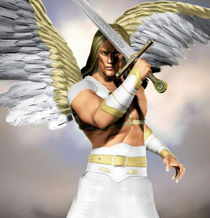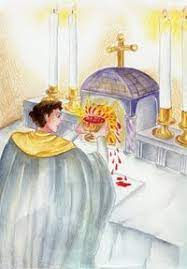The Catholic Defender: The Mystery of Melchizedek
- Donald Hartley

- May 21, 2021
- 4 min read
Updated: May 21, 2021

"When Abram heard that his kinsman had been captured, he mustered three hundred and eighteen of his retainers,* born in his house, and went in pursuit as far as Dan. He and his servants deployed against them at night, defeated them, and pursued them as far as Hobah, which is north of Damascus. He recovered all the possessions. He also recovered his kinsman Lot and his possessions, along with the women and the other people. When Abram returned from his defeat of Chedorlaomer and the kings who were allied with him, the king of Sodom went out to greet him in the Valley of Shaveh (that is, the King’s Valley). Melchizedek, king of Salem,* brought out bread and wine. He was a priest of God Most High." Genesis 14:14-18
Genesis 14 reports the battle against the five kings which ended with Abraham's successful conclusion returning what had been lost previously. He was able to free his Nephew, Lot, who was among the captured. The king of Sodom greeted Abraham in the Valley of Shaveh who obviously was very happy with the success of the victory.
A mysterious figure walked on the scene following Abrahams victory who offers bread and wine as a sacrifice identifying Melchizedek as a "priest of God Most High." There are two schools of thought being considered in reference to Melchizedek. Is Melchizedek a certain type of the Christ whose name means "king of righteousness" and "king of peace". Psalm 110:4 speaks of the Davidic Messiah was called "a priest forever in the order of Melchizedek." Even the very chalice used by Melchizedek has been handed down from Abrahams time down to our time. It is believed that Jesus Christ offers the Passover Supper using the chalice offering the Blood of Jesus. St. Peter would take this chalice to Rome and from there would become known as the legendary "Holy Grail".

It is important that Melchizedek is identified as the king of Salem (pre-Jerusalem) and a priest of God. This is also Jesus Christ who is the true King and He is the Priest of a New and Everlasting Covenant. Melchizedek stepped
onto the scene from out of no where and he vanishes as quickly as he came. Yet, he has an eternal Covenant. Palms 110:4 states, "The Lord has sworn and will not relent, “You are a priest forever according to the order of Melchizedek.”
Hebrews 7:1-5 states, "This “Melchizedek, king of Salem and priest of God Most High,” “met Abraham as he returned from his defeat of the kings” and “blessed him.” And Abraham apportioned to him “a tenth of everything.” His name first means righteous king, and he was also “king of Salem,” that is, king of peace. Without father, mother, or ancestry, without beginning of days or end of life, thus made to resemble the Son of God, he remains a priest forever. See how great he is to whom the patriarch “Abraham [indeed] gave a tenth” of his spoils. The descendants of Levi who receive the office of priesthood have a commandment according to the law to exact tithes from the people, that is, from their brothers, although they also have come from the loins of Abraham."

Five points of light I see in the significance of Melchizedek:
Melchizedek was the king of Salem (a nearby city where Abraham lived)
Melchizedek was the priest of God Most High
Melchizedek greets Abraham who returns from a victorious battle
Melchizedek blessed Abraham
Melchizedek received tithes from Abraham from of all the spoils received from the battle
In Time and space Melchizedek's mysterious priesthood points forward towards the eternal priesthood of Jesus Christ. It is through Jesus sacrifice on the cross for our sins that He offers us grace and mercy through His holy Catholic Church, the Sacraments with the Eucharist as primary.
In the Old Testament Jesus is pre-figured through many examples of His presence throughout time. Melchizedek is just one example. The fourth Man in the fire is another one:
"Shadrach, Meshach, and Abednego answered King Nebuchadnezzar, “There is no need for us to defend ourselves before you in this matter. If our God, whom we serve, can save us* from the white-hot furnace and from your hands, O king, may he save us! But even if he will not, you should know, O king, that we will not serve your god or worship the golden statue which you set up.” 'Nebuchadnezzar’s face became livid with utter rage against Shadrach, Meshach, and Abednego. He ordered the furnace to be heated seven times more than usual and had some of the strongest men in his army bind Shadrach, Meshach, and Abednego and cast them into the white-hot furnace. They were bound and cast into the white-hot furnace with their trousers, shirts, hats and other garments, for the king’s order was urgent. So huge a fire was kindled in the furnace that the flames devoured the men who threw Shadrach, Meshach, and Abednego into it. But these three fell, bound, into the midst of the white-hot furnace. Then King Nebuchadnezzar was startled and rose in haste, asking his counselors, “Did we not cast three men bound into the fire?” “Certainly, O king,” they answered. “But,” he replied, “I see four men unbound and unhurt, walking in the fire, and the fourth looks like a son of God.” Then Nebuchadnezzar came to the opening of the white-hot furnace and called: “Shadrach, Meshach, and Abednego, servants of the Most High God, come out.” Thereupon Shadrach, Meshach, and Abednego came out of the fire. When the satraps, prefects, governors, and counselors of the king came together, they saw that the fire had had no power over the bodies of these men; not a hair of their heads had been singed, nor were their garments altered; there was not even a smell of fire about them.'





















Comments